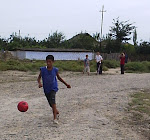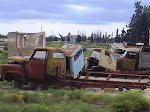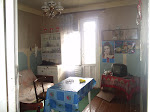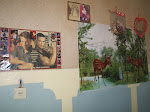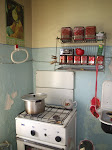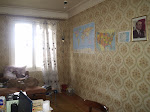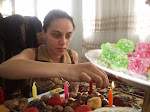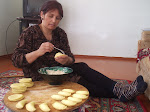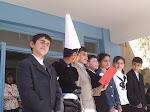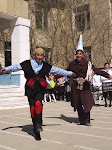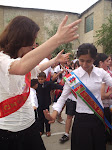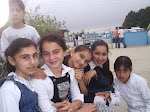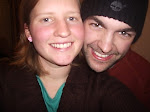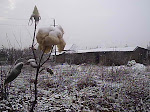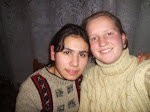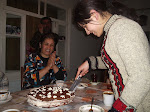6/8
Arzu, or “Wish” is the new wedding palace just outside my village. Like most wedding palaces in Azerbaijan, it is a rusty red concrete block on the side the freeway. Inside hang few flashy ornaments, such aa disco ball which marks the center of the room. On stage, the bride and groom are behind a long fringed cream-colored table, the two barely visible behind baskets of fruit, plastic rose bouquets, and boxed and bottled Russian beverages.
The newlyweds’ faces are blank, which could be interpreted as boredom, sadness, or seriousness—the latter, having not yet caught on to the speed of point and shoot cameras, the affection exhibited in most Azeri photographs. In the case of this bride, Farida Ibrahamova, I would guess it’s as sense of neutrality to the whole experience.
Guests’ tables are draped with fine white linen. Early season tomatoes and cucumbers are first to arrive. Stalichni salad of tiny potatoes, carrots, jarred peas, eggs, chunks of soft beef, mayonnaise, and salt and pepper are served, accompanied by grape leaf dolma topped with homemade bitter yogurt, and salty, fried local stuffed sturgeon. Plov, the national meal served with chigertma, a greasy dish of chicken, eggs, sautéed tomato and ghee, is the main course. Fanta, Coca-cola and fizzy water are the drink of choice on the women’s side, while vodka and red wine is a staple of the men’s.
Azerbaijani weddings are like a seven hour reception, so as the parade of food begins so do the speeches. One by one male family members drunkenly congratulate the bride and groom in repetitious lines as we do in America: “I hope your life together will happy, successful and healthy, with lots of babies!” Then the variation to modern American wishes: “And may the bride be obedient and take care of you and your children well, and cook and clean, so you can provide for your family! Best of luck!”
After each speech is lauded, the man’s immediate and extended family members dance to traditional music from the live, hired mugam band. There are no discotecks or night clubs in the regions of Azerbaijan, so Azeris pour six months of pent up moves and angst onto the dance floor.
It is now that face of the 23 years of solitude smiles, twirling with friends her husband has for months forbidden her to visit.
I dance after the director of our school exhibits his wistful but authoritarian smile to the audience. My loose wrists are tossed into the air and I shake and shake them in a pattern that compliments the accordion, tar and throatal singing of the short, stocky man on stage. I still don’t know what to do with my feet and I tell this to Nushaba but she responds, “No, Sasha, you dance like an Azeri now. It is very nice.” Apparently they also don’t know what to do with their feet.
I maneuver those awkward steps across the dance floor to photograph two young girls bounce around a 20-something male, an act acceptable exclusively at weddings. I snap a couple neighbors and they immediately ask for prints. “When I go to Baku,” I promise.
“I love him, Sasha, but he is a strict man,” she would tell me the year of her engagement.
“Farida, if Jeyhun does not let you come to my house for two hours to watch a film, this is not strict, this is crazy.”
I am seated with neighbors who are excited to see me dance, laugh and speak casually with locals on a non-work related basis.
“Sasha, you know the U.S. economy is very bad. And there’s bird flu. You can’t go back there. You have to stay, Sasha. You have to stay.”
“That is very kind, but I miss my friends and family very much.”
“But the food is very good here!”
“Yes, that’s true.”
“Do you like the wedding, Sasha?”
“Yes, you know, every wedding I go to I like better. I understand everything better, the food is my own now, I know every one and I can speak with them. It’s nice, thanks.”
Jeyhun is Farida’s cousin. “Disgusting,” we think. In reality, to ensure a positive relationship, free from unsolicited fornication and physical abuse, you marry someone you already know. Someone who knows your family and customs, parental expectations; someone you know will—above all else—keep you safe. That someone is most immediately your cousin.
Farida is wearing a strikingly blue dress to match her husband’s blue collared shirt and blue tie. She stares into the audience positioned upright, hands folded in her lap. She eats cautiously as all are watching on the three monitors hung on different sides of the room. The formality overshadows her shear eloquence.
“You can’t sleep all the time, Farida,” I would tell her weeks preceding the ceremony.
“I know, but I have nothing to do. Just sit. Then watch T.V. Help my mother.”
“Maybe you could read or something. It’s unhealthy, Farida.”
“I think it will be better, Sasha. When Jeyhun get out of army we move to Turkey. There he can paint.” And what will you do, Farida?
Farida would never break off the wedding. Too much shame and honor missed. Neighbors and family would judge. Family may not “take her back.”
But many women in America hang on because it’s shameful to do otherwise, too. Many women return to their husbands out of fear of dishonor and displacement from their community. Many women stay because they don’t know what to do or where to go otherwise.
Azerbaijanis do not have a positive view of the Western tradition of love and marriage. In America, divorce filings are common as weddings. From what Azerbaijanis see on film, affairs occupy a comfortable place in a “successful” marriage. From my experience, this state of affair is not far from the truth.
In Azerbaijan, they are trying to hold onto what I see as a broken system; but wouldn’t you say we’re doing the same? Limited access to marriage, affairs, contracts and annulments, secrets, broken homes, scarred children.
I would take our broken system over theirs any lifetime, but the more I understand this culture the more similarities I see with ours. Maybe we don’t have arranged marriages, but we have arranged social norms just like every other country in the world.
I asked yesterday as she was displaying the furniture fit for their new home what she will do if Jeyhun doesn’t let her work.
“I want to work, Sasha. But Jeyhun says ‘no.’ If he doesn’t, then I don’t know. We must see how it will be.”
6/14
Our supermarket is about half the size of a 7/11, though it shelves about three times its contents. It is located at the swooping turn on the main road, a faultless location for village residents. The store owner, Mahanmet, is also the P.E. teacher at school, and fittingly so, a real big guy.
“Sasha! How are you?” he laughs. After having facilitated football and volleyball lessons during the week, Mahanmet appears only on the weekends. He helps shelve cans and carries deliveries to the back, but mostly he watches his son and his son’s childhood friend run supplies and tally customer orders.
“Would you like tea?” He asks, seated on the lone aisle between boxes of almonds and imitation Snickers.
“Yes I would, thank you!”
Mahanmet Teacher heaves himself out of his chair and orders me to have a seat and relax.
“I will get the food for you as you drink your tea,” says the assistant shop keeper Mahir, as he hands me three pieces of nut-filled chocolates. “You can eat whatever you’d like here” he reminds me. He points to the plastic covered boxes filled with paklava and sugar cookies, which Azerbaijanis buy by the kilo. It reminds of the barrels of fig newtons at Pack ’n’ Save, which as a kid I lauded as a great supermarket innovation.
A couple months ago Mahanmet Teacher asked me why I left every weekend to the town north. “Do you want to get out of the village?”
“Well, yes, and I help the volunteer there, Jenni, do a swimming club. But I also go there to buy things I can’t get here.”
“What?! What can’t you get here?”
“Milk, lavash, different kinds of bread besides Baku bread, yellow cheese, toilet paper—” He stops me there, wide-eyed, like I said “Paper to wipe my poopy ass with.”
“I don’t eat cheese, Sasha, it’s not healthy.” Just what a P.E. coach in his condition would say.
Still, as Azerbaijanis would, two days later I returned to Mahanmet’s to discover brie and camberet. Today we have sliced white cheese and gouda. He remains stocked with toilet paper, milk and “black bread” which is the shape and texture of whole grain, and which I now slice nearly every morning to enjoy with over easy eggs.
“Sasha, what do you want?” asks Mahir.
“A half a kilo of tomatoes. Two peppers. Two garlics.”
“And then?”
“Three-cow cheese—“
“Sasha, your Azerbaijani is clean. You have learned our language, but you will forget it when you leave.”
“Yes, I know. When I come back to Azerbaijan in five years I will not know your language any more.”
Struck by the suggestion that I’d come back, he responded, “Thank you, Sasha. It’s ok you will forget, that will happen.”
Mahir finishes my order as I hit the loose leaves at the bottom of the pear glass.
“Do you want more tea, Sasha? Anything else we can get you?”
This is what they do here, not just for me, but for other guests, too.
“Oh no, thank you, I’m done. That’s it. How much is it?”“Two manats, 60 gepik.”
As negative as I am here, these people care for me. They care for me in a way my American neighbors and shop owners never have or will. Our “get-it-yourself” attitude is one I miss, yet one I may have trouble adjusting to when I get back.
“Ok, thanks. See you later!”
“Sasha, thank you! Come drink tea when you’d like!”
Sunday, June 14, 2009
Wednesday, June 3, 2009
Summer Softball
Students gain teamwork and inclusion skills, and learn to pitch a ball windmill style here:
https://www.peacecorps.gov/index.cfm?shell=resources.donors.contribute.projDetail&projdesc=314-052
Donate a buck or few, any amount'll do!
https://www.peacecorps.gov/index.cfm?shell=resources.donors.contribute.projDetail&projdesc=314-052
Donate a buck or few, any amount'll do!
Subscribe to:
Posts (Atom)



